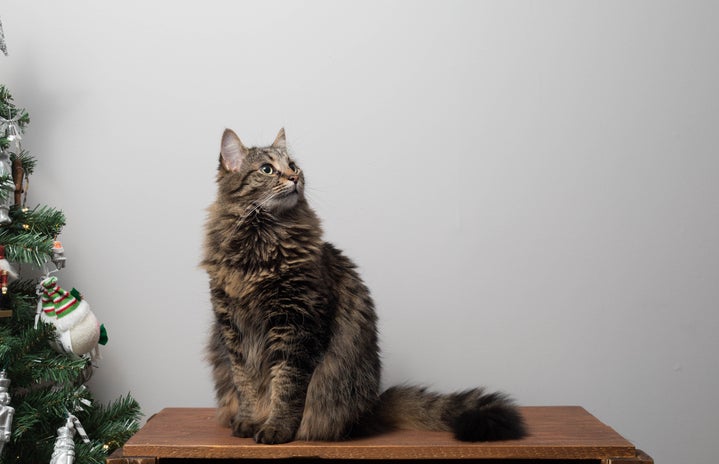As the end of my first semester on campus with my emotional support cat, Mushi, approaches, I have been reflecting on the aspects of having an ESA in college that no one talks about. I am going to talk about what actually defines an ESA, how it can be a challenge providing for them in a dorm, how it can affect your social life and how people perceive you, but most importantly how beneficial it can be.
In my experience these past few months, other students tend to forget or disregard the fact that an ESA is a recognized treatment for mental illness, not just a fun excuse to bring a pet to college. The most common question I got the first week was, “How did you get to bring your cat?” A few weeks in, I formulated the quick response of, “A lot of paperwork.” That was the easiest, honest way to deflect the conversation away from the personal struggle that brought Mushi into my life and to illustrate that it wasn’t an easy process. It is an odd concept to have strangers indirectly ask you about the most difficult part of your life before they even ask your name. It is important to recognize that none of these people had ill intentions, but I also encourage being mindful of what an ESA represents for the owner.
I would say the most difficult aspect of adjusting to college with an ESA was the guilt I felt. Mushi was used to having two floors of free roaming and was suddenly moved into a shoebox of a room. The first three weeks were a constant battle with myself, wondering if I was being selfish for bringing her with me. I knew that I needed her but I was torn thinking she might be happier at my parent’s house. I live on the fourth floor of an unairconditioned building and the first three weeks were unbearably hot. She was not eating as much as she normally would have, would not play with any of her toys, and was terrified of the hallway. I would come back to the room from class and she would be hiding inside my dresser – I had to get child locks for all my drawers. I was seriously considering whether I should keep her with me. Luckily the heat passed, and she got more accustomed to the new room and the new people. She started eating normally again and gradually became more interested in playing. Now, she’s back to her normal self, screaming at me for food every five minutes, tearing up the rug to chase her favorite ice cream toy, and sprinting into the hallway to say hello to anyone and everyone whenever I open the door, which is not appreciated when I return from showering in my towel and I have to chase her.
The first couple weeks as friendships were being formed, I was wary of people who seemed only interested in being my friend because of Mushi. Those acquaintances fizzled out, and now I joke that my real friends are the ones who are allergic to cats. I learned early on that I had to set boundaries to establish the privacy of my room and not always say yes to people asking to see the cat whenever they knocked. It was an important exercise to not let people pleasing get in the way of my own personal health. Now, I let Mushi hang out in the hallway for a bit every day so she can stretch and run, and so people who want to see her can without encroaching in my roommate and I’s personal space. People are often shocked to find out that I am allowed to have a roommate, but all I had to do was find someone okay with having a cat before requesting to be together and have her sign an agreement form.
There are several people who only know me as “cat girl” or “the one who has a cat”, and I expect this characterization to continue. It has become an integral part of how people see me and identify me. This is something I was expecting, knowing that people often find cognitive ways to remember people and that’s what stands out about me. I do not mind this characterization at all, it is only unsettling when someone I have never met knows and defines me by my cat.
Despite the challenges that have come with having Mushi with me on campus, I could not imagine it any other way. The first semester I was abroad and Mushi couldn’t come with me, I struggled to feel completely healthy. I knew that she brought an element of comfort that could not be substituted by anything else. I would not have been able to adjust to college as seamlessly as I did without her here with me. It has been so grounding for my mental health to have the consistency of being able to go back to my room and know that she will be there to greet me with a cute little meow and a head butt. She helps me get through difficult reading, as she sits on my lap and purrs, not letting me get up until I’m finished. On my bad days, I know that she’ll look at me with her “big boba eyes” (as my roommate calls them) and make me laugh as she chases a pipe cleaner in circles. She was with me through the worst of my mental health journey and I am so grateful to have her here to help me adjust in my new home.


